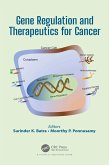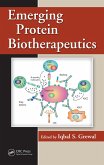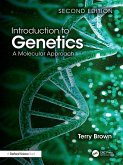Cancer through the Lens of Evolution and Ecology (eBook, ePUB)
Redaktion: Somarelli, Jason A.; Johnson, Norman A.
59,95 €
59,95 €
inkl. MwSt.
Sofort per Download lieferbar

30 °P sammeln
59,95 €
Als Download kaufen

59,95 €
inkl. MwSt.
Sofort per Download lieferbar

30 °P sammeln
Jetzt verschenken
Alle Infos zum eBook verschenken
59,95 €
inkl. MwSt.
Sofort per Download lieferbar
Alle Infos zum eBook verschenken

30 °P sammeln
Cancer through the Lens of Evolution and Ecology (eBook, ePUB)
Redaktion: Somarelli, Jason A.; Johnson, Norman A.
- Format: ePub
- Merkliste
- Auf die Merkliste
- Bewerten Bewerten
- Teilen
- Produkt teilen
- Produkterinnerung
- Produkterinnerung

Bitte loggen Sie sich zunächst in Ihr Kundenkonto ein oder registrieren Sie sich bei
bücher.de, um das eBook-Abo tolino select nutzen zu können.
Hier können Sie sich einloggen
Hier können Sie sich einloggen
Sie sind bereits eingeloggt. Klicken Sie auf 2. tolino select Abo, um fortzufahren.

Bitte loggen Sie sich zunächst in Ihr Kundenkonto ein oder registrieren Sie sich bei bücher.de, um das eBook-Abo tolino select nutzen zu können.
Cancer cells exist in an ever-changing "ecology" and are subject to evolutionary pressures just like any species in nature. The book is resource for understanding cancer as a disease of multicellularity grounded in evolutionary principles. By using this knowledge, researchers are starting to exploit these behaviors for treatment paradigms.
- Geräte: eReader
- mit Kopierschutz
- eBook Hilfe
Andere Kunden interessierten sich auch für
![Cancer through the Lens of Evolution and Ecology (eBook, PDF) Cancer through the Lens of Evolution and Ecology (eBook, PDF)]() Cancer through the Lens of Evolution and Ecology (eBook, PDF)59,95 €
Cancer through the Lens of Evolution and Ecology (eBook, PDF)59,95 €![Gene Regulation and Therapeutics for Cancer (eBook, ePUB) Gene Regulation and Therapeutics for Cancer (eBook, ePUB)]() Gene Regulation and Therapeutics for Cancer (eBook, ePUB)74,95 €
Gene Regulation and Therapeutics for Cancer (eBook, ePUB)74,95 €![Emerging Protein Biotherapeutics (eBook, ePUB) Emerging Protein Biotherapeutics (eBook, ePUB)]() Emerging Protein Biotherapeutics (eBook, ePUB)220,95 €
Emerging Protein Biotherapeutics (eBook, ePUB)220,95 €![Nanophototherapy (eBook, ePUB) Nanophototherapy (eBook, ePUB)]() Nanophototherapy (eBook, ePUB)169,95 €
Nanophototherapy (eBook, ePUB)169,95 €![Introduction to Genetics (eBook, ePUB) Introduction to Genetics (eBook, ePUB)]() Terry A. BrownIntroduction to Genetics (eBook, ePUB)56,95 €
Terry A. BrownIntroduction to Genetics (eBook, ePUB)56,95 €![Imaging in Dermatology (eBook, ePUB) Imaging in Dermatology (eBook, ePUB)]() Imaging in Dermatology (eBook, ePUB)79,95 €
Imaging in Dermatology (eBook, ePUB)79,95 €![Bone Cancer (eBook, ePUB) Bone Cancer (eBook, ePUB)]() Bone Cancer (eBook, ePUB)161,95 €
Bone Cancer (eBook, ePUB)161,95 €-
-
-
Cancer cells exist in an ever-changing "ecology" and are subject to evolutionary pressures just like any species in nature. The book is resource for understanding cancer as a disease of multicellularity grounded in evolutionary principles. By using this knowledge, researchers are starting to exploit these behaviors for treatment paradigms.
Dieser Download kann aus rechtlichen Gründen nur mit Rechnungsadresse in A, B, BG, CY, CZ, D, DK, EW, E, FIN, F, GR, HR, H, IRL, I, LT, L, LR, M, NL, PL, P, R, S, SLO, SK ausgeliefert werden.
Produktdetails
- Produktdetails
- Verlag: Taylor & Francis eBooks
- Seitenzahl: 232
- Erscheinungstermin: 29. Mai 2024
- Englisch
- ISBN-13: 9781040027684
- Artikelnr.: 70700009
- Verlag: Taylor & Francis eBooks
- Seitenzahl: 232
- Erscheinungstermin: 29. Mai 2024
- Englisch
- ISBN-13: 9781040027684
- Artikelnr.: 70700009
- Herstellerkennzeichnung Die Herstellerinformationen sind derzeit nicht verfügbar.
Jason A. Somarelli is a molecular biologist, who received his doctoral degree from Florida International University in Miami, FL and was an American Cancer Society postdoctoral fellow at Duke University. He is currently an Assistant Professor in the Department of Medicine at Duke University. Somarelli serves as the Director of Research for the Duke Cancer Institute Comparative Oncology Group and is the Director of the Duke University Marine Laboratory Scholars in Marine Medicine Program. Dr. Somarelli's research uses evolutionary and ecology paradigms to understand molecular adaptations to extreme environments. His work spans diverse topics, such as the evolutionary pressures faced by cancer cells during drug treatment and metastatic spread, the molecular adaptations of whales and other marine mammals to low oxygen conditions, and the evolution of microbes to use plastic as a nutrient source. In addition to his scholarly activities, Dr. Somarelli is passionately involved in training and education, leading multiple outreach and research training programs for high school students and undergraduates in an effort to enhance diversity in STEM careers. Norman A. Johnson is an evolutionary geneticist, who received his doctoral degree from the University of Rochester and was a postdoctoral fellow at the University of Chicago. He is now an adjunct professor in the Biology department at the University of Massachusetts at Amherst. Johnson has also taught at the University of Chicago, the University of Texas at Arlington, and Hampshire College. Most of his research has been on the genetics and evolution of why hybrids between species are often sterile or inviable. Other research interests include the evolution of sex chromosomes, the evolution of extremely large dietary niches in insects, conflict between different parts of the genome, and the interplay between the relaxation of selection and the loss of traits. Johnson's first book, Darwinian Detectives: Revealing the Natural History of Genes and Genomes (Oxford University Press, 2007), examines how biologists infer the action of natural selection and other evolutionary processes from DNA sequence information. More recently, he wrote Darwin's Reach: 21st Century Applications of Evolutionary Biology (CRC Press, 2022). This book explores how ideas and information from evolutionary are being used in diverse ways in the realms of health, food, the environment, and society at large. Dr. Johnson has been active in science communication and outreach; notably, he co-led the National Evolutionary Synthesis Center working group on communicating the relevance of human evolution.
Foreword
Randolph Nesse
Chapter 1: A species within a species
Jason A. Somarelli and Norman A. Johnson
Chapter 2: Therapy As a Driver of Evolutionary Selection
Dana Ataya, Joel S. Brown and Robert A. Gatenby
Chapter 3: The Genetic Hitchhiker's Guide to Tumor Evolution
Rohini Janivara and Joseph Lachance
Chapter 4: Multicellularity, phenotypic heterogeneity, and cancer
Christopher Helenek, Jason A. Somarelli, and Gábor Balázsi
Chapter 5: Feedback loops in gene regulatory networks and cell-cell
communication networks: drivers of cancer cell plasticity
Yeshwanth Mahesh, Subbalakshmi Ayalur Raghu, Mohit Kumar Jolly
Chapter 6: Polygenic Evolution of Germline Variants in Cancer
Ujani Hazra and Joseph Lachance
Chapter 7: Two-phased cancer evolution: the pattern and scale of genomic
and nongenomic landscapes
Andrzej Kasperski and Henry H. Heng
Chapter 8: Evolutionary and ecological perspective on the multiple states
of T cell exhaustion
Irina Kareva and Joel S. Brown
Chapter 9: Landscape Genetics for Cancer Biology
Erin L. Landguth and Norman A. Johnson
Chapter 10: Tumor Island Biogeography: Theory and Clinical Applications
Antonia Chroni
Chapter 11: Cancer and the Evolutionary Ecology of Invasions
Joel S. Brown, Sarah A. Amend and Kenneth J. Pienta
Chapter 12: Unifying Theories in Comparative Oncology
Zachary T. Compton
Chapter 13: From Evolutionary Biology to Bedside and Beyond: A View of
Comparative Oncology Throughout the Translational Pipeline
Veronica Colmenares, William C. Eward, Laurie A. Graves
Chapter 14: What do we gain from viewing cancer through an eco-evo lens?
Jason A. Somarelli and Norman A. Johnson
Randolph Nesse
Chapter 1: A species within a species
Jason A. Somarelli and Norman A. Johnson
Chapter 2: Therapy As a Driver of Evolutionary Selection
Dana Ataya, Joel S. Brown and Robert A. Gatenby
Chapter 3: The Genetic Hitchhiker's Guide to Tumor Evolution
Rohini Janivara and Joseph Lachance
Chapter 4: Multicellularity, phenotypic heterogeneity, and cancer
Christopher Helenek, Jason A. Somarelli, and Gábor Balázsi
Chapter 5: Feedback loops in gene regulatory networks and cell-cell
communication networks: drivers of cancer cell plasticity
Yeshwanth Mahesh, Subbalakshmi Ayalur Raghu, Mohit Kumar Jolly
Chapter 6: Polygenic Evolution of Germline Variants in Cancer
Ujani Hazra and Joseph Lachance
Chapter 7: Two-phased cancer evolution: the pattern and scale of genomic
and nongenomic landscapes
Andrzej Kasperski and Henry H. Heng
Chapter 8: Evolutionary and ecological perspective on the multiple states
of T cell exhaustion
Irina Kareva and Joel S. Brown
Chapter 9: Landscape Genetics for Cancer Biology
Erin L. Landguth and Norman A. Johnson
Chapter 10: Tumor Island Biogeography: Theory and Clinical Applications
Antonia Chroni
Chapter 11: Cancer and the Evolutionary Ecology of Invasions
Joel S. Brown, Sarah A. Amend and Kenneth J. Pienta
Chapter 12: Unifying Theories in Comparative Oncology
Zachary T. Compton
Chapter 13: From Evolutionary Biology to Bedside and Beyond: A View of
Comparative Oncology Throughout the Translational Pipeline
Veronica Colmenares, William C. Eward, Laurie A. Graves
Chapter 14: What do we gain from viewing cancer through an eco-evo lens?
Jason A. Somarelli and Norman A. Johnson
Foreword
Randolph Nesse
Chapter 1: A species within a species
Jason A. Somarelli and Norman A. Johnson
Chapter 2: Therapy As a Driver of Evolutionary Selection
Dana Ataya, Joel S. Brown and Robert A. Gatenby
Chapter 3: The Genetic Hitchhiker's Guide to Tumor Evolution
Rohini Janivara and Joseph Lachance
Chapter 4: Multicellularity, phenotypic heterogeneity, and cancer
Christopher Helenek, Jason A. Somarelli, and Gábor Balázsi
Chapter 5: Feedback loops in gene regulatory networks and cell-cell
communication networks: drivers of cancer cell plasticity
Yeshwanth Mahesh, Subbalakshmi Ayalur Raghu, Mohit Kumar Jolly
Chapter 6: Polygenic Evolution of Germline Variants in Cancer
Ujani Hazra and Joseph Lachance
Chapter 7: Two-phased cancer evolution: the pattern and scale of genomic
and nongenomic landscapes
Andrzej Kasperski and Henry H. Heng
Chapter 8: Evolutionary and ecological perspective on the multiple states
of T cell exhaustion
Irina Kareva and Joel S. Brown
Chapter 9: Landscape Genetics for Cancer Biology
Erin L. Landguth and Norman A. Johnson
Chapter 10: Tumor Island Biogeography: Theory and Clinical Applications
Antonia Chroni
Chapter 11: Cancer and the Evolutionary Ecology of Invasions
Joel S. Brown, Sarah A. Amend and Kenneth J. Pienta
Chapter 12: Unifying Theories in Comparative Oncology
Zachary T. Compton
Chapter 13: From Evolutionary Biology to Bedside and Beyond: A View of
Comparative Oncology Throughout the Translational Pipeline
Veronica Colmenares, William C. Eward, Laurie A. Graves
Chapter 14: What do we gain from viewing cancer through an eco-evo lens?
Jason A. Somarelli and Norman A. Johnson
Randolph Nesse
Chapter 1: A species within a species
Jason A. Somarelli and Norman A. Johnson
Chapter 2: Therapy As a Driver of Evolutionary Selection
Dana Ataya, Joel S. Brown and Robert A. Gatenby
Chapter 3: The Genetic Hitchhiker's Guide to Tumor Evolution
Rohini Janivara and Joseph Lachance
Chapter 4: Multicellularity, phenotypic heterogeneity, and cancer
Christopher Helenek, Jason A. Somarelli, and Gábor Balázsi
Chapter 5: Feedback loops in gene regulatory networks and cell-cell
communication networks: drivers of cancer cell plasticity
Yeshwanth Mahesh, Subbalakshmi Ayalur Raghu, Mohit Kumar Jolly
Chapter 6: Polygenic Evolution of Germline Variants in Cancer
Ujani Hazra and Joseph Lachance
Chapter 7: Two-phased cancer evolution: the pattern and scale of genomic
and nongenomic landscapes
Andrzej Kasperski and Henry H. Heng
Chapter 8: Evolutionary and ecological perspective on the multiple states
of T cell exhaustion
Irina Kareva and Joel S. Brown
Chapter 9: Landscape Genetics for Cancer Biology
Erin L. Landguth and Norman A. Johnson
Chapter 10: Tumor Island Biogeography: Theory and Clinical Applications
Antonia Chroni
Chapter 11: Cancer and the Evolutionary Ecology of Invasions
Joel S. Brown, Sarah A. Amend and Kenneth J. Pienta
Chapter 12: Unifying Theories in Comparative Oncology
Zachary T. Compton
Chapter 13: From Evolutionary Biology to Bedside and Beyond: A View of
Comparative Oncology Throughout the Translational Pipeline
Veronica Colmenares, William C. Eward, Laurie A. Graves
Chapter 14: What do we gain from viewing cancer through an eco-evo lens?
Jason A. Somarelli and Norman A. Johnson







